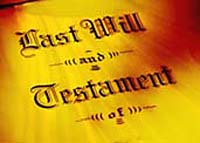 “Many people draft personal notes to their loved ones and their successors. However, few take the time to pen a thoughtful letter to their executor to help guide their decisions in the future.”
“Many people draft personal notes to their loved ones and their successors. However, few take the time to pen a thoughtful letter to their executor to help guide their decisions in the future.”
A detailed, informative letter can be invaluable to your executor to make your wishes known, says the article “Why You Should Write a Letter to Your Executor—and What to Say in It” from The Wall Street Journal. Your last will and testament does have many directions. However, there may be things you want your executor to know that may not be included in your will. This is especially important if death is sudden. The letter, which you should sign and date, can help prevent potential disputes, by minimizing any confusion around your intentions, priorities and goals.
Here are some things to consider when drafting a letter to your executor.
Your thoughts about wealth. Share your story about how you came to the assets that you are leaving in your will. How was your wealth created, what do you value and what are your long-term goals for your wealth? Do you want family members to invest the assets, so they grow over generations, or do you want them used for college education costs for grandchildren?
Describe key players in the family. It is best if your executor knows the members of your family. However, they may not know the family dynamics or history. Giving them your insights, may help them anticipate issues. Does one child tend to take over and speak for everyone, without being asked? Are there substance abuse issues in the family that need to be considered? Present your executor with your concerns, so they can be mindful of how the family works (or doesn’t) as a unit.
What matters to you? This is especially important, if you don’t want your heirs to be dependent upon their inheritance, instead of becoming self-reliant. Share your values to encourage their earned success. Make it clear if you want to protect the family wealth, so it can be used to empower future generations and for family members to be responsible for their own financial well-being.
Give your executor the power to made decisions, even when that means saying no. Considering the size of your wealth and the family members who are your heirs, you probably have a good idea of who would do what with their inheritance. If you don’t want your wealth to be used for a start-up by a son who always bets on the wrong horse, say so in the letter to your executor. If you are hopeful that a daughter will use her inheritance for a down payment on a home for her family, you should also express that.
Some wishes for your wealth can be expressed through the use of trusts and other wealth planning tools. Your estate planning attorney will help create a plan that incorporates asset protection, tax planning and tools to distribute wealth in the way that you wish. An experienced estate planning attorney has worked with many families and understands the challenges and pitfalls that are presented any time wealth is transferred from one generation to the next.
Reference: The Wall Street Journal (April 8, 2020) “Why You Should Write a Letter to Your Executor—and What to Say in It”
